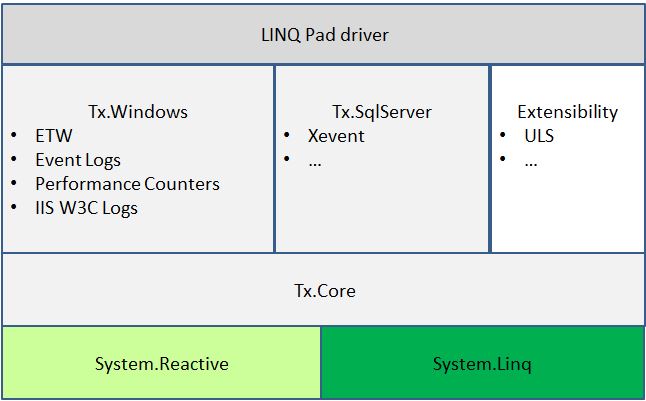|
|
||
|---|---|---|
| Doc | ||
| Generated | ||
| Manifests | ||
| References | ||
| Samples | ||
| Source | ||
| Test | ||
| Tools | ||
| Traces | ||
| .gitignore | ||
| Common.targets | ||
| Contributors.txt | ||
| README.md | ||
| TxCodeMap.JPG | ||
| license.txt | ||
README.md
Tx (LINQ to Logs and Traces)
Tx allows you to do Language Integrated Query (LINQ) directly on raw event sources:
- ad-hoc query on past history in trace and log files
- standing queries on real-time feeds, such as Event Tracing for Windows (ETW) sessions
The Tx approach is different than Databases, Hadoop, Splunk, Dapper, etc. which all require a stage of uploading before the events become available to queries.
Instead, mixing Reactive Extensions (Rx) and LINQ-to-Objects allows the query to be embedded anywhere including:
- In light-weight UI tools like LINQPad and SvcPerf
- On original source machines, such as Synthetic Counters
The following picture shows the dependencies among the main Tx components:
Here:
- Dark green is .Net
- Light green is mature open source
- Light grey are framework components, also available on NuGet
- Darker gray are tool experiences that come with Tx
- White are samples
For more see the documentation
Contributing
There are lots of ways to contribute to the project, and we appreciate our contributors. We strongly welcome and encourage contributions to this project. Please read the contributor's guide. If making a large change we request that you open an issue first. We follow the Git Flow approach to branching.
This project has adopted the Microsoft Open Source Code of Conduct. For more information see the Code of Conduct FAQ or contact opencode@microsoft.com with any additional questions or comments.

